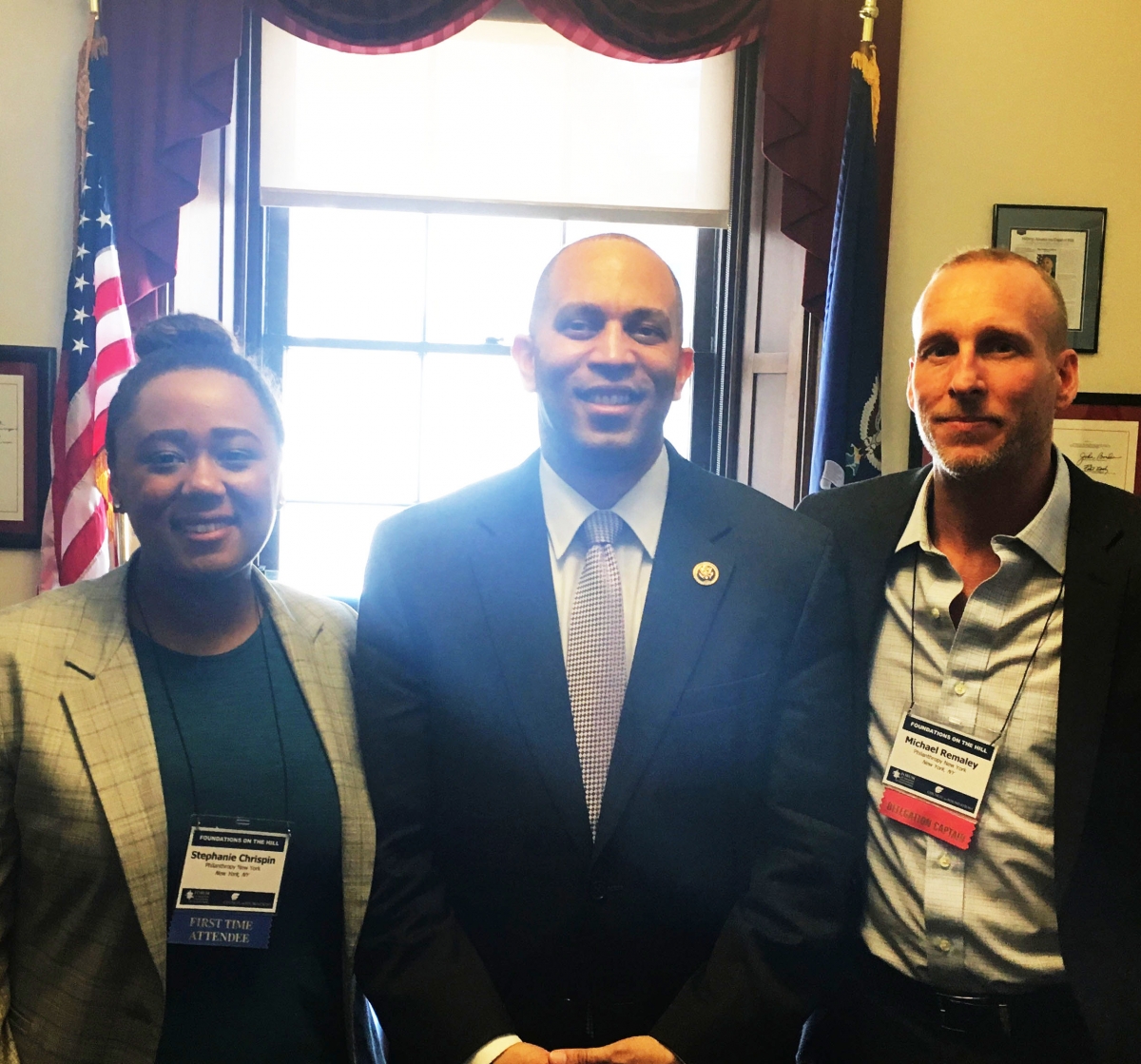 From left to right: Stephanie Chrispin, Public Policy Fellow, Rep. Hakeem Jeffries (D-NY), and Michael Remaley, Senior Vice President of Public Policy and Communications. |
#FOTH2016, From a First-Timer’s Perspective
By Stephanie Chrispin, Philanthropy New York Public Policy Fellow
In the nine months since I came to Philanthropy New York as the inaugural Public Policy Fellow, I have experienced many “firsts.” One of my most remarkable experiences has been talking directly with U.S. Congressional staff while attending last week’s annual Foundations on the Hill event. It was particularly interesting to observe how meaningful Philanthropy New York’s voice can be on the Hill.
I woke up at 4 a.m. to catch a train with Philanthropy New York’s Senior Vice President for Public Policy and Communications Michael Remaley and spent the next two days criss-crossing the Hill for back-to-back meetings with the legislative directors, counsels and assistants who keep the House and Senate moving. We even had a chance to sit down with some representatives themselves. (One unexpected highlight: Running into Sen. Charles Schumer in a tight back-office hallway and him stopping to introduce himself to me!)
No matter their level on the congressional totem pole, those we encountered seemed to be truly engaged and expressed their thanks for voicing the concerns of nonprofits and foundations working for change in their congressional districts. Those new to their roles got a full overview of the philanthropic sector and the different kinds of support we can give policymakers and their communities.
With congressional staffers more familiar with our field, Michael and I had a chance to delve deeper into the issues they care about and where our members had great interest in moving the needle. During our meeting with Rep. Hakeem Jeffries, D-NY, for example, we had a chance to discuss the work Brooklyn Community Foundation is doing in his district around participatory grantmaking.
For all our meetings, we spoke on perennial issues like simplifying the excise tax on private foundations and maintaining the charitable deduction in its current form, topics that will likely take on more prominence in the coming year.
But from my perspective, the most revelatory conversations centered on the Office and Management Budget (OMB) Uniform Guidance on Indirect Costs. This is an issue that federal legislators are not likely to be involved in directly, but we raised it with them to gauge whether or not they were hearing concerns about it from their nonprofit constituents.
Few of the congressional staff we met had been aware of the state and city-level conversations that are occurring around the OMB Guidance and the potential impact on the long-term sustainability of nonprofits in their districts. They were, nonetheless, very interested in learning more about what New York state and city officials are doing to respond to the OMB Guidance. After hearing about the generally slow pace of integrating the OMB Guidance into the contracting process, one legislative assistant expressed interest in proposing some sort of federal legislative solution, such as proposing a resolution clarifying that states taking federal money must follow the OMB Guidance on Indirect Costs.
While the New York nonprofit advocacy organizations Philanthropy New York has been working with on this issue feel that federal legislation is not the right way to approach moving the OMB Guidance forward in our state, it was still refreshing to talk to a key legislative aid about an issue we’re working on and have them propose a possible solution. For me, it confirmed Philanthropy New York’s place as a thought leader on nonprofit and philanthropic policy issues.
These conversations made me even more excited about our ongoing work on OMB Guidance back here in New York. Last October, we brought together New York state and city government leaders, funders, nonprofit advocacy groups, and major social service delivery organizations to discuss the progress of OMB Guidance implementation. As Michael noted in his column back in December, both the nonprofit and government sides found PNY’s role as a convener for this issue to be particularly useful, even though the meeting last fall did not produce a definitive outcome.
Philanthropy New York is committed to moving the process forward by hosting a second convening to check in on how city and state are implementing OMB Guidance within their agencies, hear from nonprofits about what they are experiencing in the contracting process and decide if further action is warranted.
Our next convening of government, nonprofit and foundation leaders on OMB Guidance is taking place May 2. We invite funders interested in nonprofit fiscal stability and long-term sustainability to join us. If you would like to join us for that discussion, please contact Michael by email.
One of the biggest takeaways that came out of my experience with Foundations on the Hill is the complexity of the relationships and influence across federal, state and city government on any given issue. I enjoyed watching legislative staff light up as they learned about this issue and felt really privileged to be a part of these conversations.
And now that I know how Foundations on the Hill goes, I’m excited to go deeper into the planning and execution of our efforts next year when comprehensive tax reform, and many of the issues philanthropy cares about, may be very prominent in Washington.
